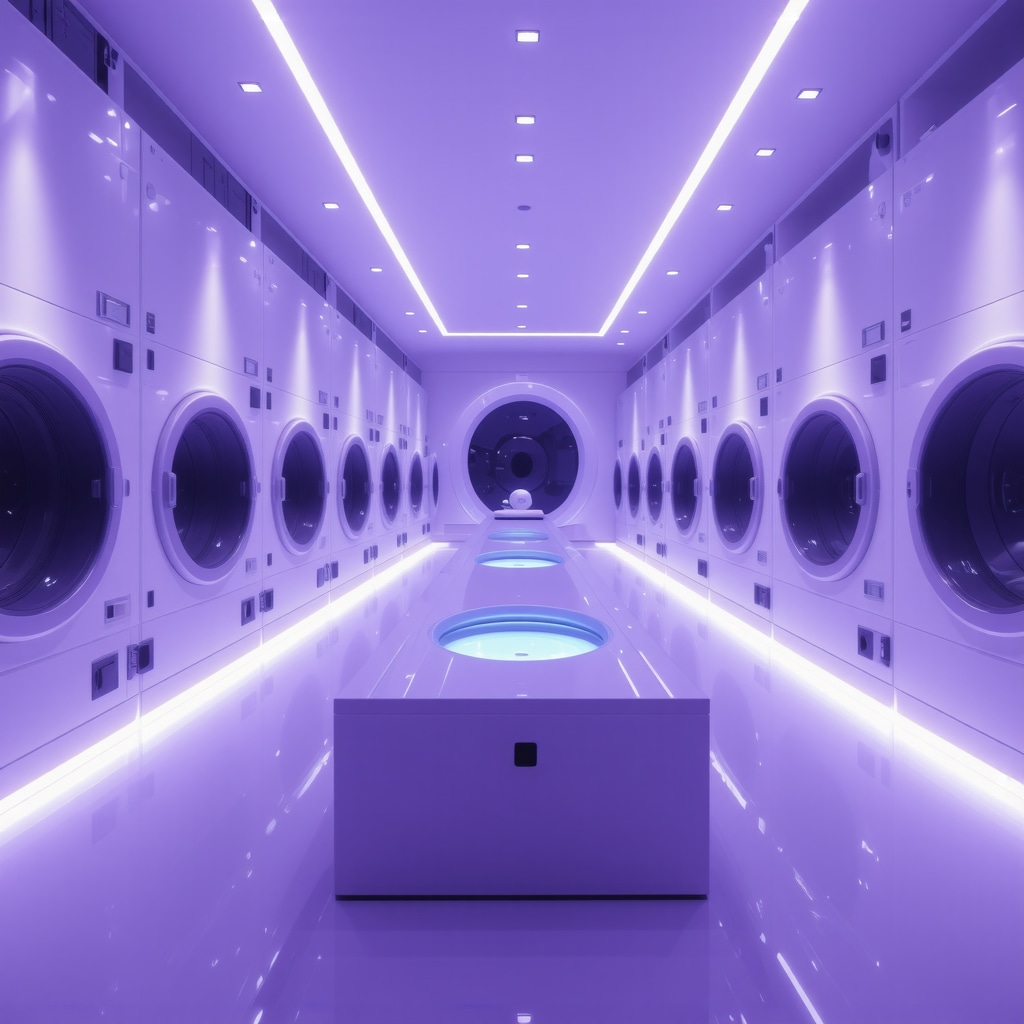Revolutionizing Fabric Care: The Intersection of Eco-Consciousness and Professional Dry Cleaning in Tampa
In the pursuit of sustainable living, the traditional dry cleaning industry faces a paradigm shift driven by environmental imperatives and health consciousness. Tampa’s discerning consumers increasingly demand services that not only preserve the integrity of delicate garments but also prioritize the well-being of their families and the planet. This article explores the nuanced landscape of eco-friendly dry cleaning, emphasizing cutting-edge practices and scientific insights that elevate fabric care to an art form rooted in sustainability.
Understanding the Complexities of Chemical-Free Fabric Preservation
Conventional dry cleaning relies heavily on perchloroethylene (perc), a solvent linked to environmental pollution and health risks. However, the advent of plant-based solvents and innovative techniques has revolutionized the industry. These methods leverage natural oils, biodegradable surfactants, and carbon dioxide extraction, aligning with the principles detailed in recent white papers on green chemistry (see more). Such advancements ensure that garments are meticulously cleaned without compromising ecological integrity.
How Does Sustainable Fabric Care Impact Indoor and Outdoor Air Quality?
Expert analyses reveal that traditional solvents emit volatile organic compounds (VOCs), contributing to indoor air pollution and exacerbating respiratory issues. Transitioning to eco-friendly solutions significantly reduces VOC emissions, fostering healthier indoor environments—especially vital for vulnerable populations like children and allergy sufferers. Tampa’s green dry cleaners are pioneering this shift, integrating advanced filtration and solvent recycling systems to minimize environmental footprints.
What Are the Emerging Technologies in Eco-Conscious Garment Restoration?
Technological innovation encompasses ultrasonic cleaning, laser-based stain removal, and the use of enzyme-based detergents. These methods exemplify the industry’s commitment to non-toxic, sustainable practices. For instance, organic stain removal techniques utilizing natural enzymes effectively treat delicate fabrics, preserving their longevity and appearance. Such technologies are discussed in detail in specialized journals and are gaining traction among Tampa’s eco-conscious dry cleaners.
What are the key considerations when selecting an eco-friendly dry cleaner for sensitive skin and delicate fabrics?
Choosing a service that employs certified organic solvents, adheres to strict environmental standards, and demonstrates transparent practices is essential. Certifications such as Green Seal or EcoLogo provide assurance of sustainable operations. Additionally, inspecting the cleaning process for the use of hypoallergenic and non-toxic products ensures safety for sensitive skin, aligning with emerging consumer health priorities.
For further insights into sustainable garment care, explore our detailed guide on sustainable garment care techniques.
Engaging with industry experts and contributing to the dialogue on eco-friendly practices is crucial. Share your experiences and stay updated by visiting our contact page or reading authoritative sources like the latest research on green cleaning innovations.
Unveiling the Next Generation of Sustainable Fabric Care: What Are the Cutting-Edge Technologies Shaping Tampa’s Green Dry Cleaning Industry?
As the demand for eco-conscious fabric care continues to rise, Tampa’s dry cleaning industry is embracing groundbreaking innovations that promise safer, more sustainable results. From advanced ultrasonic cleaning to enzyme-based stain removal, these techniques are redefining standards and setting new benchmarks for eco-friendly practices. The integration of these technologies not only enhances cleaning efficacy but also aligns with the broader movement towards reducing environmental impact, as highlighted in recent industry reports (see more).
How Do Ultrasonic and Laser Technologies Elevate Sustainable Garment Restoration?
Ultrasonic cleaning utilizes high-frequency sound waves to create microscopic bubbles that gently dislodge dirt and stains from delicate fabrics. This method minimizes water and chemical use, significantly lowering the ecological footprint of garment restoration. Similarly, laser-based stain removal offers precision targeting, reducing the need for harsh chemicals and ensuring the integrity of sensitive textiles. These innovations are gaining traction in Tampa, where eco-conscious consumers seek effective yet environmentally safe solutions. For those interested in adopting these modern techniques, exploring options like organic stain removal with enzymes can provide a safer alternative to traditional chemical treatments (learn more).
Can the Future of Fabric Care Be Truly Chemical-Free and Sustainable?
Absolutely. The trajectory of eco-friendly fabric care points toward a future where chemical-free, plant-based solvents and innovative mechanical processes dominate the industry. Continuous research into biodegradable, non-toxic cleaning agents—such as plant-derived solvents—supports this shift. Experts emphasize that the key lies in adopting a holistic approach that combines technological innovation, rigorous environmental standards, and consumer education. Tampa’s leading eco-dry cleaners are already pioneering this movement, ensuring that luxury and sustainability go hand in hand. Want to explore how these advancements can benefit your wardrobe? Check out our detailed guide on green low-emission dry cleaning practices.
What actionable steps can consumers and industry professionals take to accelerate the adoption of these innovative, sustainable cleaning methods?
Engaging with certified eco-friendly providers, advocating for transparency in cleaning processes, and supporting industry standards like Green Seal certification are essential. Consumers should prioritize services that employ non-toxic, plant-based, and biodegradable solvents, while professionals can invest in research and training to implement the latest technologies. Educating oneself about the science behind these innovations—such as the benefits of enzyme-based stain removal and ultrasonic cleaning—can also foster broader acceptance and demand. Join the conversation and share your experiences by commenting below or recommending further reading on plant-based cleaning solutions.
Advanced Mechanical Processes and Their Role in Sustainable Fabric Restoration
Leading edge mechanical processes like ultrasonic cleaning and laser stain removal exemplify how technology can dramatically reduce environmental impact while enhancing cleaning efficacy. Ultrasonic cleaning, which employs high-frequency sound waves, produces microscopic cavitation bubbles that gently dislodge dirt from fabrics with minimal water and chemical use. This not only conserves resources but also preserves fabric integrity, especially crucial for delicate textiles. Similarly, laser stain removal offers precision targeting, reducing the need for harsh chemicals that can damage sensitive fibers and the environment. These innovations are increasingly adopted by Tampa’s eco-conscious dry cleaners, aligning with the broader movement toward sustainable garment care.
Understanding the Nuances of Plant-Based Solvent Efficacy in Fabric Cleaning
Plant-based solvents, such as soy or citrus-derived options, are gaining recognition for their superior performance and eco-friendly profile. Unlike traditional perc, these biodegradable solvents break down naturally without releasing toxic byproducts. Recent studies highlight their effectiveness in removing complex stains while maintaining fabric softness and color vibrancy (see detailed research here). However, optimizing their formulation for different fabric types and stain complexities remains a sophisticated challenge requiring ongoing scientific innovation. Tampa’s industry leaders are investing in research collaborations to refine these solutions, ensuring they meet rigorous standards for sustainability and performance.
Harnessing Nanotechnology for Superior Eco-Conscious Fabric Restoration
Emerging research indicates that nanotechnology is poised to revolutionize sustainable fabric care by enabling targeted stain removal and fabric strengthening at a molecular level. Nano-sized particles can penetrate deep into fibers, lifting stains without the need for aggressive chemicals, thus preserving delicate textiles and enhancing longevity. Industry leaders in Tampa are exploring this frontier, leveraging functionalized nanoparticles that can neutralize odors and reinforce fiber resilience, aligning with the latest breakthroughs documented in the Scientific Reports.
What Role Does Artificial Intelligence Play in Optimizing Eco-Friendly Dry Cleaning?
Advanced AI algorithms are increasingly integrated into dry cleaning operations to optimize solvent usage, monitor environmental standards, and predict fabric-specific cleaning protocols. Machine learning models analyze historical data to recommend the most sustainable cleaning techniques, reducing resource waste and enhancing efficiency. Tampa’s eco-conscious cleaners are adopting these intelligent systems to meet stringent environmental certifications and improve customer satisfaction through personalized, eco-friendly care plans.
How Can Industry Standards Evolve to Accelerate Adoption of Sustainable Practices?
The development of comprehensive certification systems and regulatory frameworks is essential for mainstreaming eco-friendly dry cleaning. Initiatives like the Green Seal certification establish rigorous standards, incentivizing adoption of non-toxic solvents, energy-efficient equipment, and transparent practices. Industry stakeholders in Tampa can champion these standards, fostering consumer trust and elevating the sector’s sustainability profile through collaboration and advocacy.
What are the most sophisticated methods for integrating sustainability metrics into daily dry cleaning operations?
Implementing real-time monitoring systems that track solvent emissions, water consumption, and energy use allows for precise management of environmental impacts. Data analytics dashboards provide actionable insights, enabling continuous improvement. Advanced sensors and IoT devices can detect leaks, optimize solvent recycling, and ensure compliance with environmental standards. Embracing these technologies positions Tampa’s dry cleaners at the forefront of sustainable innovation, delivering eco-friendly outcomes with measurable results. For a comprehensive understanding, consult industry case studies available at Sustainable Brands.
The Future of Fabric Care: Integrating Bioengineering and Mechanical Precision
Bioengineering introduces enzyme formulations tailored for specific stain types, reducing the need for harsh chemicals and enhancing biodegradability. Coupled with precision mechanical methods like ultrasonic and laser cleaning, these innovations promise a future where fabric restoration is both highly effective and environmentally benign. Tampa’s pioneering dry cleaners are investing in R&D collaborations to refine these techniques, ensuring they meet rigorous sustainability standards while delivering exceptional results.
How Can Consumers Influence the Transition Toward Truly Chemical-Free Fabric Care?
Consumer demand for transparency and eco-certifications drives industry change. By prioritizing services that employ plant-based, biodegradable solvents and requesting transparency regarding cleaning processes, customers can accelerate adoption of sustainable practices. Educational initiatives, such as workshops and informational campaigns, empower consumers to make informed choices. Active participation in community dialogue and feedback channels further encourages industry-wide innovation, creating a ripple effect that benefits both the environment and public health.

Expert Insights & Advanced Considerations
1. Embracing Nanotechnology for Precision Cleaning
Nanotechnology enables targeted stain removal and fabric strengthening, significantly reducing chemical usage and prolonging garment lifespan. Industry leaders in Tampa are pioneering nano-enhanced solutions that deliver superior results sustainably.
2. Integrating Artificial Intelligence for Process Optimization
AI-driven systems analyze fabric types and stain profiles to recommend eco-friendly cleaning protocols. This smart approach minimizes resource waste and ensures consistent quality, setting new standards in sustainable garment care.
3. Developing Certification Standards and Industry Collaboration
Establishing rigorous eco-certifications like Green Seal, coupled with collaborative industry initiatives, accelerates the adoption of sustainable practices. Tampa’s dry cleaners are actively participating in these movements to elevate sector credibility and consumer trust.
4. Leveraging Bioengineering for Eco-Conscious Solutions
Bioengineered enzymes tailored for specific stains reduce reliance on harsh chemicals, enhancing biodegradability and fabric safety. This innovation is pivotal for high-end, delicate garment restoration, aligning with eco-friendly directives.
5. Utilizing Real-Time Environmental Impact Monitoring
Advanced sensors and IoT devices track emissions, water, and energy use, enabling continuous improvement. Tampa’s industry leaders are implementing these technologies to demonstrate measurable sustainability metrics.
Curated Expert Resources
- Green Science Principles: Offers scientific insights into green chemistry and biodegradable cleaning agents, vital for developing safer solutions.
- Industry Certification Bodies: Such as Green Seal, provide frameworks that ensure compliance with high sustainability standards.
- Scientific Journals on Nanotechnology & Bioengineering: Publish cutting-edge research on eco-friendly fabric care innovations, critical for industry advancement.
- AI and IoT in Sustainable Manufacturing: Reports and case studies that illustrate how intelligent systems optimize environmental performance.
- Local Industry Collaborations: Engagements among Tampa dry cleaners foster knowledge exchange and accelerate technology adoption.
Final Expert Perspective
In the realm of eco-friendly fabric care, Tampa’s dry cleaning industry exemplifies how integrating advanced technologies like nanotechnology, AI, and bioengineering can redefine standards—making sustainability not just a trend but a core operational principle. Embracing these innovations enables professionals to deliver superior quality while championing environmental responsibility. To deepen your expertise and contribute to this transformative movement, explore our comprehensive guide on zero-waste dry cleaning practices and join the conversation with fellow industry pioneers committed to sustainable excellence.

